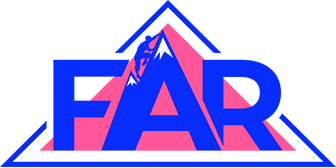FAR offers comprehensive treatment for those individuals that may be suffering from a substance abuse disorder as well as a mental illness. Dual diagnosis requires an integrated approach that addresses both disorders respectively. A co-occurring mental health disorder is common with individuals suffering from addiction as substance abuse may cause a mental illness. Conversely, a mental illness can cause a substance abuse issue as people try to self-medicate.
Getting the help you need to overcome mental health and substance abuse issues will help you live a much more fulfilling life! Dual diagnosis treatment is the first step on your way to recovery.
What Is
Dual Diagnosis?
Dual diagnosis, also known as co-occurring disorders, is when an individual suffers from both a substance abuse disorder and a mental health disorder. To properly recover, both disorders must be treated simultaneously as they often interact with each other. One disorder can exacerbate the symptoms of the other and one may even compromise the prognosis of the other.
Dual diagnosis treatment programs in North Carolina are common because there is such a large link between drug abuse and mental health disorders. According to NAMI (National Alliance on Mental Illness), 1 in 5 adults in America experiences some form of mental illness, and 1 in 25 suffer from a serious mental illness that significantly disrupts their life. Of this group, almost 60% will also suffer from a substance abuse disorder.
How Does Addiction And Mental Illness
Occur Simultaneously?
There are a few different ways that someone might suffer from both an addiction and a mental illness. It’s important to note that addiction can sometimes be a symptom of mental illness, rather than two separate disorders. For example, someone with bipolar disorder might turn to alcohol to self-medicate when they’re experiencing mania.
Dual diagnosis treatment in North Carolina will take this into account when developing a treatment plan. Other times, someone might develop an addiction as a way of numbing the pain of their mental illness. This is especially common among people who suffer from PTSD or depression.
It’s also possible for someone to be predisposed to both mental illness and addiction because of their family history or genetic makeup.
What Are Common Warning Signs Of A Co-Occurring Disorder?
The following are warning signs that someone might be dealing with a co-occurring disorder:
- They’re unable to stick to their treatment plan for their mental illness
- Using alcohol or drugs to self-medicate
- Experiencing a worsening of their mental symptoms
- Engaging in risky behaviors
- Lack of awareness of self-care and appearance
- Withdrawing from friends and family and other activities
- Having difficulty meeting their responsibilities at work or school
- Encountering problems with money
If you notice any of these warning signs in yourself or a loved one, it’s important to seek dual diagnosis treatment in North Carolina as soon as possible.
Common Types of Mental Illness That
Co-Occur With Addiction
Many mental health conditions are typically present alongside substance abuse. In many cases, these issues are what cause a person to engage in substance abuse behavior. It’s also common that someone doesn’t realize that they are suffering from a mental health condition as many signs and symptoms are similar to other issues.
This is what makes getting mental health treatment so important.
Anxiety disorders are the most common mental illness in the U.S., affecting 40 million adults. That’s 18% of the population! Anxiety disorders are characterized by fear and worry. This can be constant or come and go. People with anxiety often have physical symptoms such as a racing heart, sweating, and difficulty sleeping. Because of these symptoms, individuals look for forms of relief or attempt to “calm” their anxiety. This usually just makes it worse.
Bipolar disorder is a mental health condition that is characterized by extreme mood swings. These swings can range from feeling high and energized (mania) to feeling low and depressed (depression). People with bipolar disorder often have trouble sleeping, eating, and concentrating. Co-occurring substance abuse is usually an attempt to self-medicate the extreme highs and lows of emotions.
Trauma is a mental health condition that can occur after someone has experienced or witnessed a life-threatening event. This event could be something like a car accident, natural disaster, physical abuse, or sexual assault. People who have experienced trauma often have flashbacks, and nightmares, and feel detached from the world around them. Co-occurring substance abuse is very common for individuals suffering from trauma or PTSD.
Obsessive-compulsive disorder (OCD) is a mental health condition that is characterized by intrusive thoughts (obsessions) and repetitive behaviors (compulsions). People with OCD often have very specific rituals that they feel they must complete avoiding the bad things happening that they are worried about. It is not uncommon that someone tries to escape obsessions and compulsions by engaging in substance abuse.
Schizophrenia is a mental health disorder that is characterized by hallucinations, delusions, and disorganized thinking. People with schizophrenia often have a hard time functioning in society and may turn to drugs or alcohol as a way to cope with the symptoms of their disorder.
What Are The Benefits Of Dual Diagnosis Treatment?
Dual diagnosis treatment can provide a comprehensive approach to treating both disorders. This can lead to better outcomes and a higher quality of life for those who receive this type of care.
Dual diagnosis treatment can help to:
- Address the underlying causes of both disorders
- Reduce or eliminate the symptoms of both disorders
- Improve functioning in daily life
- Develop a long-term care plan while in recovery
- Better understand your environmental triggers for both disorders
Since co-occurring disorders are very common, treatment centers understand the importance of having an integrated approach. Dual diagnosis treatment can better prepare people for how to manage their conditions than a program that targets only one condition.
Treatments And Therapies Offered In A
Dual Diagnosis Program
Dual diagnosis treatment centers offer various therapies and treatments that can be tailored to meet the unique needs of each individual. Some common therapies and treatments that may be offered include:
CBT can help people to identify and change negative thinking patterns and behaviors.
This form of therapy can help people to cope with difficult emotions and situations.
This type of therapy can help to improve communication and relationships within a family.
Group therapy can provide support and allow people to share their experiences with others who are going through similar issues.
This type of treatment can help to manage the symptoms of mental health disorders.
Who Is A Candidate For Dual Diagnosis Treatment?
Dual diagnosis treatment programs in North Carolina can vary depending on the needs of the individual. It is important to find a program that will address both substance abuse disorders and mental health disorders. Treatment should be tailored to the individual’s needs and should be based on evidence-based practices.
People who have been diagnosed with both a substance abuse disorder and a mental health disorder are candidates for dual diagnosis treatment. Treatment should be tailored to the individual’s needs.
Dual diagnosis treatment programs will address both substance abuse disorders and mental health disorders. Treatment should be based on evidence-based practices.
Is Dual Diagnosis Treatment
Covered By Insurance?
Most insurance companies will cover dual diagnosis treatment. If you have private insurance, you should check with your insurer to see what is covered. If you do not have private insurance, you may be eligible for public insurance, such as Medicaid. You can also reach out to our admissions team to discuss your payment options as they will help you review any confusing insurance lingo to help you better understand what your options may be.
Recover With FAR's Dual Diagnosis Treatment Program
If you or a loved one is struggling with a co-occurring disorder, we can help. Our dual diagnosis treatment program is designed to address both substance abuse and mental health issues. We will create a personalized treatment plan that meets your unique needs. We offer a variety of services, including individual therapy, group therapy, and family therapy. We also offer medication management, if needed.
Our dual diagnosis treatment program is located in Wallace, North Carolina. We offer a safe and nurturing environment where you can begin your journey to recovery. Contact us today to learn more about our dual diagnosis treatment program or to schedule an appointment.

